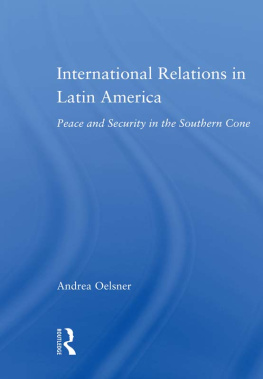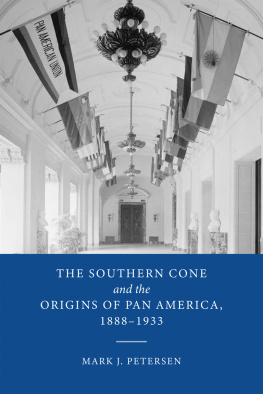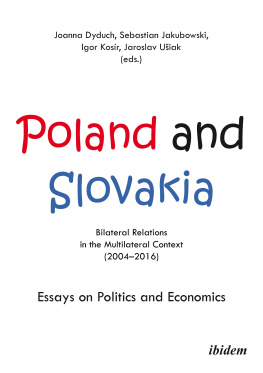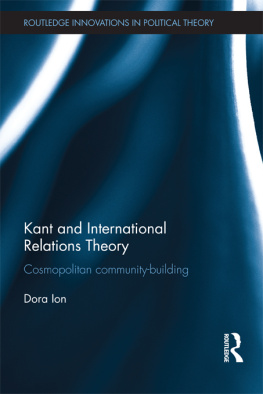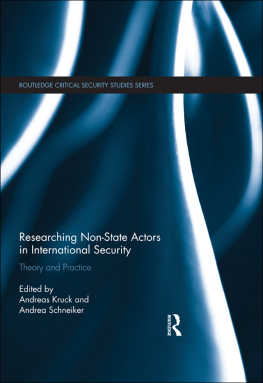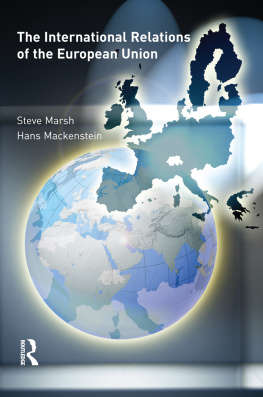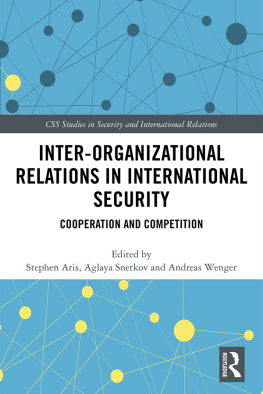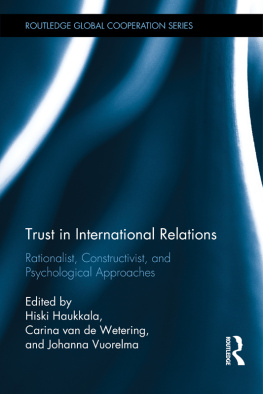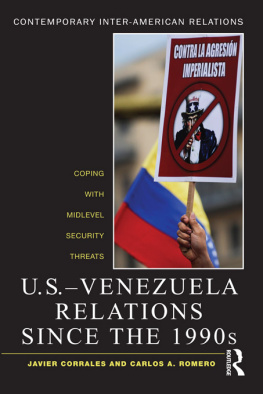LATIN AMERICAN STUDIES
SOCIAL SCIENCES AND LAW
Edited by
David Mares
University of California, San Diego
A ROUTLEDGE SERIES
LATIN AMERICAN STUDIES
DAVID MARES, General Editor
OBSERVING OUR HERMANOS DE ARMAS
U.S. Military Attachs in Guatemala, Cuba, and Bolivia, 19501964
Robert O. Kirkland
LAND PRIVATIZATION IN MEXICO
Urbanization, Formation of Regions, and Globalization in Ejidos
Mara Teresa Vzquez Castillo
THE POLITICS OF THE INTERNET IN THIRD WORLD DEVELOPMENT
Challenges in Contrasting Regimes with Case Studies of Costa Rica and Cuba
Bert Hoffmann
CONTESTING THE IRON FIST
Advocacy Networks and Police Violence in Democratic Argentina and and Chile
Claudio A. Fuentes
LATIN AMERICA'S NEO-REFORMATION
Religion's Influence on Contemporary Politics
Eric Patterson
INSURGENCY, AUTHORITARIANISM, AND DRUG TRAFFICKING IN MEXICO'S DEMOCRATIZATION
Jos Luis Velasco
THE POLITICS OF SOCIAL POLICY CHANGE IN CHILE AND URUGUAY
Retrenchment Versus Maintenance, 19731998
Rossana Castiglioni
AN INDUSTRlAL GEOGRAPHY OF COCAINE
Christian M. Allen
STATE AND BUSINESS GROUPS IN MEXICO
The Role of Informal Institutions in the Process of Industrialization, 19361984
Arnulfo Valdivia-Machuca
LEFT IN TRANSFORMATION
Uruguayan Exiles and the Latin American Human Rights Networks, 19671984
Vania Markarian
INTERNATIONAL RELATIONS IN LATIN AMERICA
Peace and Security in the Southern Cone
Andrea Oelsner
INTERNATIONAL RELATIONS IN LATIN AMERICA
PEACE AND SECURITY IN THE SOUTHERN CONE
Andrea Oelsner
Routledge
New York & London
Published in 2005 by
Routledge
Taylor & Francis Group
270 Madison Avenue
New York, NY 10016 | Published in Great Britain by
Routledge
Taylor & Francis Group
2 Park Square
Milton Park, Abingdon
Oxon OX14 4RN |
2005 by Taylor & Francis Group, LLC
Routledge is an imprint of Taylor & Francis Group.
Transferred to Digital Printing 2009
International Standard Book Number-10: 0-415-97307-4 (Hardcover)
International Standard Book Number-13: 978-0-415-97307-6 (Hardcover)
Library of Congress Card Number 2005005642
No part of this book may be reprinted, reproduced, transmitted, or utilized in any form by any electronic, mechanical, or other means, now known or hereafter invented, including photocopying, microfilming, and recording, or in any information storage or retrieval system, without written permission from the publishers.
Trademark Notice: Product or corporate names may be trademarks or registered trademarks, and are used only for identification and explanation without intent to infringe.
Library of Congress Cataloging-in-Publication Data
Oelsner, Andrea.
International relations in Latin America: peace and security in the
Southern Cone / Andrea Oelsner,
p. cm. -- (Latin American studies)
Includes bibliographical references and index.
ISBN 0-415-97307-4 (alk. paper)
1. Southern Cone of South America--Foreign relations. 2. Southern
Cone of South America--Economic integration. 3.
Argentina--Relations--Chile. 4. Chile--Relations--Argentina. 5.
Argentina--Relations--Brazil. 6. Brazil--Relations--Argentina.7.
Peace. I. Title. II. Series: Latin American studies (Routledge (Finn))
F2217.0352005
327.82081--dc22 |
2005005642 |
ISBN10: 0-415-97307-4 (hbk)
ISBN 10: 0-415-80395-0 (pbk)
ISBN13: 978-0-415-97307-6 (hbk)
ISBN13: 978-0-415-80395-3 (pbk)
Publisher's Note
The publisher has gone to great lengths to ensure the quality ofthis reprint but points out that some imperfections in the original may be apparent.
 | Visit the Taylor & Francis Web site at
http://www.taylorandfrancis.com
and the Routledge Web site at
http://www.routledge-ny.com |
To Rosa, Carlos, Edith and Werner, and their families, who came to the Southern Cone in the search for a zone of peace
Contents
Chapter One
Introduction
Chapter Two
Theories of Regional Security and Peace
Chapter Three
Domestic Conditions
Chapter Four
Hemispheric Context
Chapter Five
Bilateral Relations between Argentina and Chile
Chapter Six
Bilateral Relations between Argentina and Brazil
Chapter Seven
Regional Integration in the Southern Cone
Chapter Eight
Conclusion
This book was born of my PhD thesis. As in many cases, writing the thesis was mostly a solitary work. However, along the way, friends and colleagues helped me feel less isolated, as we shared and exchanged ideas, experiences, opinions, and each other's chapters and papers. In one way or another, almost all of this is reflected in the work, since they helped me to rethink most of my initial beliefs, even in those cases when our conversations and shared moments had nothing to do with my studies. Although many names are present in my mind, I can only mention here those without whom, I feel, writing this work would have been impossible.
Nicky Short and Franziska Hagedorn have been excellent traveling companions, as well as great friends and colleagues. Clearly, without them this book would not have been possible. They know that no words will ever be enough. I am also deeply grateful to Paul Phibbs, Tani Kahan, Robert Funk, Alberto Lidji, Paris Yeros, Pamina Firchow, Ralf Emmers, Louiza Odysseos, Annika Bolten, Christina Malathouni, and Rut Diamint for their generous friendship, of which I took advantage, asking them to comment, proofread, and even edit parts of this work.
Christopher Coker and Francisco Panizza provided me with excellent academic support and intellectual guidance. I want to thank them for that as well as for enduring my anxiety during the final stage of my research. In addition, this project has benefited from the timely and thoughtful comments from Andrew Hurrell, Michael Williams, and David Mares.
Several organizations offered the financial support needed to carry out this research. These were the Fundacin Antorchas, Fundacion Estenssoro/YPF, and the LSE. The Robert Schuman Centre of the European University Institute (EUI-Florence) generously supported the final stage of the project.
Finally, I would like to thank Rolando, whose patience, love and encouragement have made the past three years much happier, and have helped me keep some mental sanity during the last two months of writing. My parents, my sisters, and my grandmothers, as well as my three brilliant step-sisters Astrid, Carla and Lila, were simply incredible in the unconditional support and invaluable understanding that they gave me all the way through. This was so important that, again, there are hardly any words to express my gratitude.

